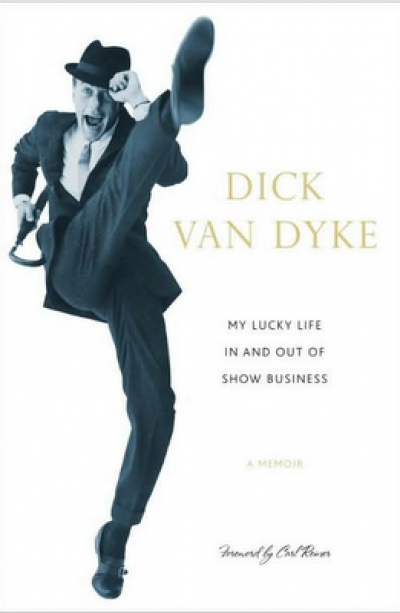
Dick Van Dyke—My Lucky Life In and Out of Show Business—A Memoir
By Dick Van Dyke (Crown Archetype, New York)
OK, he’s in his 80s and one of the most well-liked performers of the 20th century, a guy who always worked “clean” and endeared himself to such iconic iconoclastic artistic geniuses as Gower Champion, Carl Reiner and Walt Disney.
But Dick Van Dyke’s autobiography is so gosh-darn nice that it not only gets grating, it inspires you to sift for dirt between the lines.
For starters, this ain’t a Michael Caine or Dirk Bogarde tome, full of deeply wrought personal revelations and illuminating insights into the performing process. Nah, it’s closer to the namedropping anecdote anthologies of David Niven or Alan Alda, only lots lighter. Van Dykes’ few admitted regrets and confessions are transmitted on the same easygoing wavelength as the behind-the-scenes TV and movie gossip.
I like his various TV shows fine—Dick Van Dyke gets my eternal admiration for having Andy Kaufman as a writer and performer on the variety show Van Dyke and Company back in 1975 (two years before Kaufman’s own special Andy’s Funhouse and three years before Taxi), but could certainly have written a lot more about the show in his book. All his shows, for that matter.
There’s a whole chapter on Bye Bye Birdie, but it invites more questions than it answers. If it’s possible to downplay the importance of being granted the lead role in a Broadway show directed by Gower Champion, when one has only comedy-club experience and no dance training, Van Dyke downplays it. He makes his whole life out to be a chronic condition of being in the right place at the right time, hence the book’s title My Lucky Life In and Out of Show Business. After pages and pages of this good-natured aw-shuckness, you start to work an alternate version of Van Dyke’s life in your head. His understated admissions start to seem like cover-ups. For instance, Van Dyke was a regular churchgoer and self-styled theologian who even considered going into the ministry instead of becoming an actor. Yet when he was rebuffed for suggesting a multi-racial interdenominational religious gathering sometime in the 1970s, he quit organized religion altogether and says he hasn’t attended church since—even though the sort of Interfaith he sought has made enormous progress in the last 30 or 40 years.
His ingratiating presence—he maintains that in most of his roles, from The Dick Van Dyke Show to Diagnosis Murder, he was basically playing himself—seems to counter a highly addictive personality, considering his book’s frequent accounts of alcoholism and nicotine addiction treatments. He doesn’t paint a very dark side, but recounts numerous intensive yet failed attempts to quit smoking and drinking.
In his love life, Van Dyke depicts himself as a devoted spouse and parent. Yet after decades of marriage, he begins an affair (chaste, it seems, at first, but he admits that passion was involved and it felt adulterous) with a women famed for hooking up with big stars and whose lawsuit against Lee Marvin coined the term “palimony.” Dick Van Dyke divorces his wife, marries Michelle Triola, and lives with her, unmarried, for 35 years. His brother Jerry is apparently the one who takes care of the aging Van Dyke parents. Major setbacks in the lives of Dick’s children are minor points in the narrative, mostly inserted as time-markers.
The whole book has a white middlebrow “average American air.” When writing about campy queers like Paul Lynde and Charles Nelson Reilly, Van Dyke will identify them chiefly through their uniqueness “(“No one has ever played the part like him”), which I recall from my own Midwestern upbringing used to be cultural code for “not normal.”
I’m definitely reading way too much into this, and I’m not even really passing judgement here—I think Van Dyke’s time with Triola sounds cool, and I respect anyone who can be such a big star for such a long time and still have such a glowing reputation. But this book is so squeaky clean it actually inspires you to crawl under rocks looking for dirt.
Anyhow, here’s my favorite anecdote from the whole book, which may give you a sense of how lightweight My Lucky Life is. It’s about the Broadway Bye Bye Birdie days:
I was especially fond of my understudy, Charles Nelson Reilly. I hadn’t met anyone quite like him, but I took to him instantly. He was hysterically funny, clever, quick, and intelligent. I was never bored around him. On the first night of previews, it was raining, and he came into my dressing room with a scarf around his head and purred, ‘Hello, my name is Eve Harrington. I’m such a fan of your work.’
He did the whole scene from All About Eve, which put me on the floor. He was one of a kind.

I read a lot of interesting posts here. Probably you spend a
lot of time writing, i know how to save you a lot of work, there is an online tool that creates readable, SEO friendly posts in minutes, just search in google – laranitas
free content source
Valuable information. Lucky me I found your site by accident, and I’m shocked why this accident didn’t happened earlier! I bookmarked it.